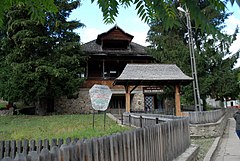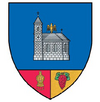Colți
Colți | |
|---|---|
 Location in Buzău County | |
| Coordinates: 45°23′N 26°24′E / 45.383°N 26.400°E | |
| Country | Romania |
| County | Buzău |
| Established | 1508 (first attested) |
| Subdivisions | Aluniș, Colți, Colții de Jos, Muscelul Cărămănești |
| Government | |
| • Mayor (2020–2024) | Gheorghe Ștefan[1] (PMP) |
| Population (2021-12-01)[2] | 809 |
| Time zone | EET/EEST (UTC+2/+3) |
| Postal code | 127195 - 127198 |
| Vehicle reg. | BZ |
Colți (Romanian pronunciation: [kolt͡sʲ]) is a commune in Buzău County, Muntenia, Romania, located in the Pătârlagele hollow, at the curvature of the Carpathian Mountains, 13 km away from the town of Pătârlagele. It is composed of four villages: Aluniș, Colți, Colții de Jos and Muscelu Cărămănești.
Landmarks
The amber museum

Colți is known for having been the only place in Romania where amber was extracted. The old amber mine has been closed since 1948, but the commune is the location of the only amber museum in Romania. The museum was opened in 1973 and exhibits pieces of amber and other minerals as well as deeds and documents that refer to amber mining.[3]
The most important exhibits are some pieces of amber that weigh over 1.5 kilograms, an earring with a piece of amber that preserves a 3-million-year-old ant, and another piece that kept the shape of the tree from whose resin it emerged.[3]
Amber is a common ornament for the people of Colți, who wear amber pieces as good luck charms.
The Aluniș cave-church
6 km away from the commune's center lies the village of Aluniș, where medieval cave settlements can be found. A cave-church was dug in the sandstone in 1274, by local shepherds, and served as a monastery until 1871. Since then, it has served as the village Eastern Orthodox church.
Notes
- ^ "Results of the 2020 local elections". Central Electoral Bureau. Retrieved 16 June 2021.
- ^ "Populaţia rezidentă după grupa de vârstă, pe județe și municipii, orașe, comune, la 1 decembrie 2021" (XLS). National Institute of Statistics.
- ^ a b "Web page about the amber museum".


